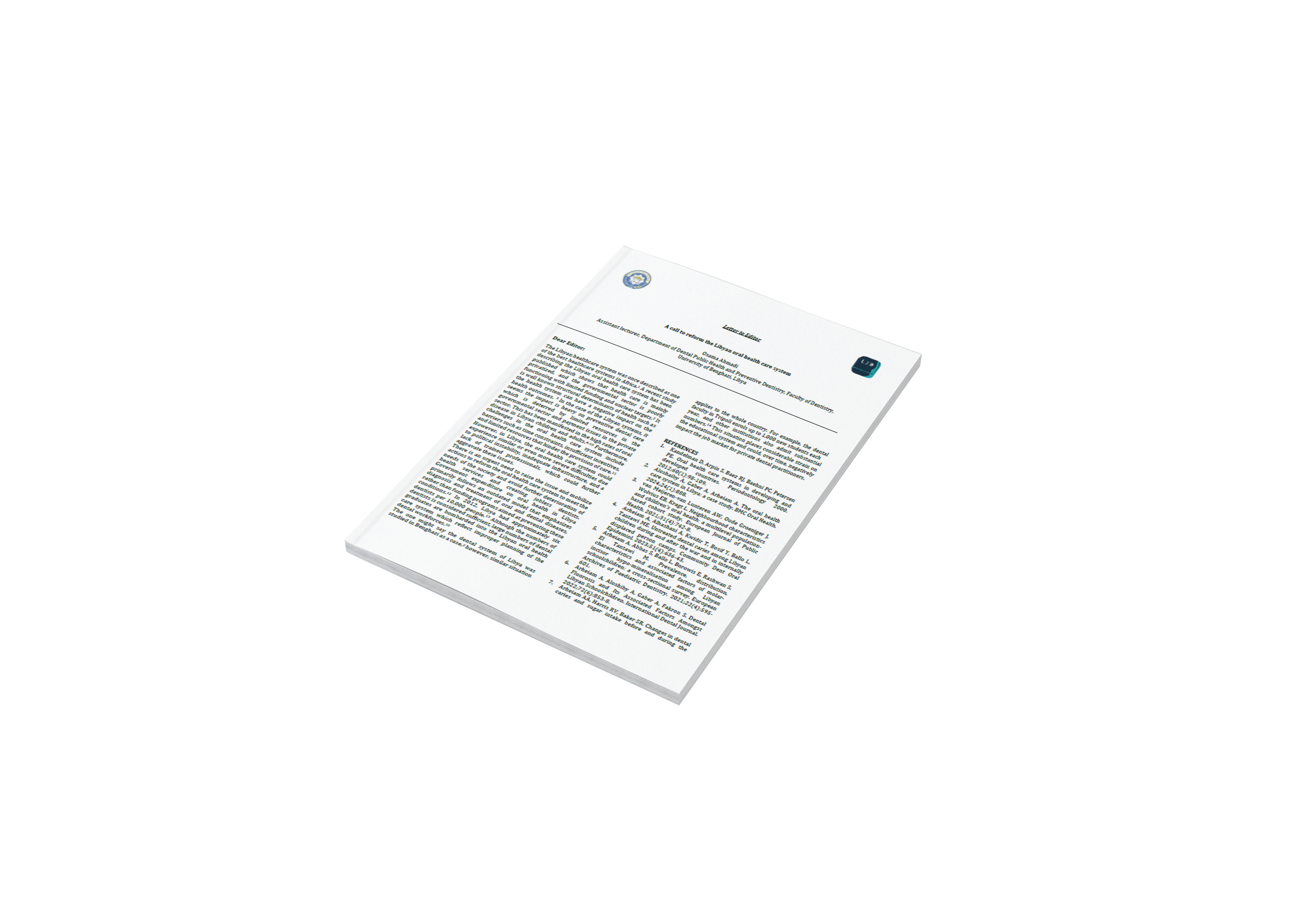A call to reform the Libyan oral health care system
DOI:
https://doi.org/10.37376/ljd.v8i2.7158Abstract
The Libyan healthcare system was once described as one of the best healthcare systems in Africa.1 A recent study describing the Libyan oral health care system has been published which shows that health care is mainly privatized, and the governmental sector is poorly functioning with limited funding and unclear targets.2 It is well known structural determinants of health such as the health system can have a negative impact on the health outcomes. 3 In the case of the Libyan systems, it seems the impact is heavy on preventive dental care which is deterred by limited resources in the governmental sector and payment issues in the private sector. This has been manifested in the high rates of oral disease in Libyan children and adults.4-10 Furthermore, challenges in the oral health care system include barriers such as time constraints, insufficient incentives, and limited resources that hinder the provision of care.11 However, in Libya, the oral health care system could experience similar or even more severe difficulties due to political instability, inadequate infrastructure, and a lack of trained professionals, which could further aggravate these issues.
There is an urgent need to raise the issue and mobilize actions to reform the oral health care system to meet the needs of the society and avoid further deterioration of health services and creating jobless dentists. Government expenditure on oral health in Libya primarily follows an outdated model that emphasizes diagnosis and treatment of oral and dental diseases, rather than funding programs aimed at preventing these conditions.12 In 2012, Libya had approximately six dentists per 10,000 people.13 Although the numbers of dentists is considered sufficient, large numbers of dental graduates are bombarded into the Libyan oral health care system which reflect improper planning of the dental workforces.10
The one might say the dental system of Libya was studied in Benghazi as a case,2 however, similar situation
applies to the whole country. For example, the dental faculty in Tripoli enrols up to 1,000 new students each
year, and other institutions also admit substantial numbers.14 This situation places considerable strain on the educational system and could, over time, negatively impact the job market for private dental practitioners.
Downloads
References
Kandelman D, Arpin S, Baez RJ, Baehni PC, Petersen PE. Oral health care systems in developing and developed countries. Periodontology 2000. 2012;60(1):98-109.
Aloshaiby A, Gaber A, Arheiam A. The oral health care system in Libya: a case study. BMC Oral Health. 2024;24(1):888.
van Meijeren-van Lunteren AW, Oude Groeniger J, Wolvius EB, Kragt L. Neighbourhood characteristics and children’s oral health: a multilevel population-based cohort study. European Journal of Public Health. 2021;31(4):742-8.
Arheiam A, Alhashani A, Kwidir T, Bosif Y, Ballo L, Tantawi ME. Untreated dental caries among Libyan children during and after the war and in internally displaced person camps. Community Dent Oral Epidemiol. 2023;51(4):636-43.
Arheiam A, Abbas S, Ballo L, Borowis E, Rashwan S, El Tantawi M. Prevalence, distribution, characteristics and associated factors of molar-incisor hypo-mineralisation among Libyan schoolchildren: a cross-sectional survey. European Archives of Paediatric Dentistry. 2021;22(4):595-601.
Arheiam A, Aloshiby A, Gaber A, Fakron S. Dental Fluorosis and Its Associated Factors Amongst Libyan Schoolchildren. International Dental Journal. 2022;72(6):853-8.
Arheiam AA, Harris RV, Baker SR. Changes in dental caries and sugar intake before and during the conflict in Libya: A natural experiment. Community Dentistry and Oral Epidemiology. 2020;48(3):201-7.
Ballo L, Arheiam A, Marhazlinda J. Determinants of caries experience and the impact on the OHRQOL of 6-year-old Libyan children: a cross-sectional survey. BMC Oral Health. 2021;21(1):320.
Arheiam A, ELTantawi M, ELkadiki N, Elhashani A, Baker SR. Cross-cultural adaptation of the Arabic version of the DHEQ-15. 2022;20(3):527-33.
Arhoma N, Arheiam AJLJoD. The dental workforce in Libya: an overlooked research topic. 2022;6(1):1-3.
Ahmadi O, Machuca C, Sabbah WJPE, Counseling. Socioeconomic inequality in the provision of health advice in dental setting in England, Wales and Northern Ireland. 2019;102(11):2068-72.
Huew R, Waterhouse P, Moynihan P, Kometa S, Maguire AJIJoPD. Dental caries and its association with diet and dental erosion in Libyan schoolchildren. 2012;22(1):68-76.
Organization WH. Dentists, regional health observatory. WHO. 2012.
Peeran SW, Altaher OB, Peeran SA, Alsaid FM, Mugrabi MH, Ahmed AM, et al. Oral health in Libya: addressing the future challenges. 2014;9(1).

Downloads
Published
How to Cite
Issue
Section
License
Copyright (c) 2025 Libyan Journal of Dentistry

This work is licensed under a Creative Commons Attribution-NonCommercial-NoDerivatives 4.0 International License.







